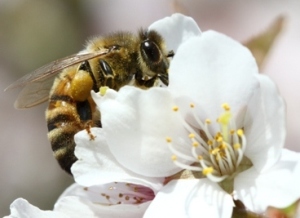Europe lacks 13 million beehives to pollinate crops
Release Date 08 January 2014

Europe has 13.4 million too few honeybee colonies to properly pollinate its crops, according to new research from the University of Reading.
The discovery, made by scientists at the University's Centre for Agri-Environmental Research (CAER), shows that demand for insect pollination is growing five times as fast as the number of honeybee colonies across Europe as farmers grow more oil crops, such as oilseed rape and sunflowers, and fruit.
See our scientists talking about their work >>>
Researchers, led by Professor Simon Potts at the University of Reading, compared the numbers of active beehives to the demand for pollination services across 41 European countries, and mapped the changes between 2005 and 2010. They found:
- In more than half of European countries - including the UK, France, Germany and Italy, there were not enough honeybees to properly pollinate the crops grown.
- The problem was particularly acute in Britain, which has only a quarter of the honeybees it needs to pollinate crops.
- Only Moldova - one of the continent's poorest countries, with an economy more than 300 times smaller than Britain's - has a bigger honeybee deficit than the UK.
- Europe as a whole only has two thirds of the honeybee colonies it needs, with a deficit of more than 13.4 million colonies
The findings suggest that agriculture in many countries is increasingly reliant upon wild pollinators, such as bumblebees, solitary bees and hoverflies. However, Europe still lacks coherent environmental and agricultural policies to protect these insects' habitats.
Dr Tom Breeze, who conducted the research published today (8 January 2014) in the journal PLOS One, said: "This study has shown that EU biofuel policy has had an unforeseen consequence in making us more reliant upon wild pollinators.
"The results don't show that wild pollinators actually do all the work, but they do show we have less security if their populations should collapse."
This follows other research from the University of Reading, published last month in Biological Conservation, showing that wild pollinators such as bumblebees and solitary bees are just as effective pollinators of oilseed rape as honeybees.
Professor Simon Potts said: "We face a catastrophe in future years unless we act now. Wild pollinators need greater protection. They are the unsung heroes of the countryside, providing a critical link in the food chain for humans and doing work for free that would otherwise cost British farmers £1.8bn to replace.
"There is a growing disconnection between agricultural and environmental policies across Europe. Farmers are encouraged to grow oil crops, yet there is not enough joined-up thinking about how to help the insects that will pollinate them.
"We need a proper strategy across Europe to conserve wild bees and pollinators through habitat protection, agricultural policy and farming methods - or we risk big financial losses to the farming sector and a potential food security crisis."
The team also highlighted the economic impacts of pollination services to the British apple industry in a third study. Insect pollinators add £37m a year to the value of just two varieties of British apples, Gala and Cox, by increasing fruit yield and quality, found University of Reading researchers led by Dr Mike Garratt. The findings are published this month in the journal Agriculture, Ecosystems and Environment.
ENDS
For more information or to organise interviews, contact Pete Castle at the University of Reading press office on +44 (0)118 378 7391 or p.castle@reading.ac.uk
Notes to editors:
See our scientists talking about their work >>>
Research was conducted by the University of Reading's Centre for Agri-Environmental Research, and funded by the STEP Project (Status and Trends of European Pollinators) project through the European Community's Seventh Framework Programme (EU FP7) and the Insect Pollinators Initiative (IPI) Crops project, funded and partnered by the BBSRC, NERC, Defra, Scottish Government, Living with Environmental Change, and Wellcome Trust.
"Agricultural Policies Exacerbate Honeybee Pollination Service Supply-Demand mismatches across Europe" is published in the journal Public Library of Science One - the world's largest open access journal - and is available for free download by anyone here >>>
Full references:
Breeze T.D., Vaissiere B., Bommarco R., Petanidou T., Seraphides N, Kozák L., Scheper J., Biesmeijer J.C., Kleijn D., Gyldenkærne S., Moretti. M., Holzscuh A., Steffan-Dewenter I., Stout J., Pärtel M., Zobel M. & Potts S.G. (2014) Agricultural Policies Exacerbate Honeybee Pollination Service Supply-Demand Mismatches Across Europe; PLoS One http://dx.plos.org/10.1371/journal.pone.0082996
Garrat M.P., Breeze T.D., Jenner N., Polce C., Biesmeijer J.C and Potts S.G. (2014) Avoiding a bad apple: insect pollination enhances fruit quality and economic value; Agriculture Ecosystems and Environment 184, 34-40 http://www.sciencedirect.com/science/article/pii/S0167880913003848#
Garratt, M.P.D., Coston D.J., Truslove C.L., Lappage M.G., Polce C., Dean R., Biesmeijer J.C. and Potts S.G. (2014) The identity of crop pollinators helps target conservation for improved ecosystem services; Biological Conservation 169, 128-135 http://www.sciencedirect.com/science/article/pii/S0006320713003807
